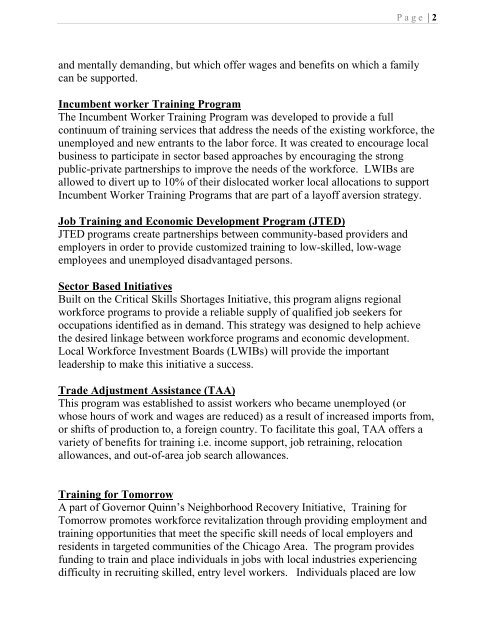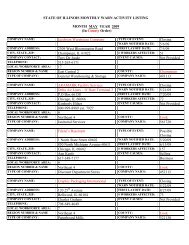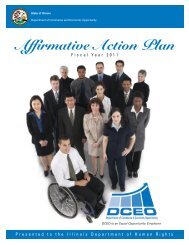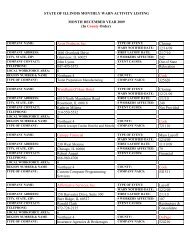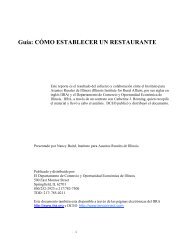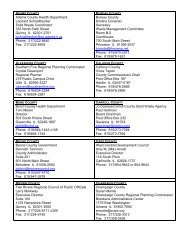January 18, 2011 Dr. Geoffrey S. Obrzut President Illinois ...
January 18, 2011 Dr. Geoffrey S. Obrzut President Illinois ...
January 18, 2011 Dr. Geoffrey S. Obrzut President Illinois ...
You also want an ePaper? Increase the reach of your titles
YUMPU automatically turns print PDFs into web optimized ePapers that Google loves.
P a g e | 2<br />
and mentally demanding, but which offer wages and benefits on which a family<br />
can be supported.<br />
Incumbent worker Training Program<br />
The Incumbent Worker Training Program was developed to provide a full<br />
continuum of training services that address the needs of the existing workforce, the<br />
unemployed and new entrants to the labor force. It was created to encourage local<br />
business to participate in sector based approaches by encouraging the strong<br />
public-private partnerships to improve the needs of the workforce. LWIBs are<br />
allowed to divert up to 10% of their dislocated worker local allocations to support<br />
Incumbent Worker Training Programs that are part of a layoff aversion strategy.<br />
Job Training and Economic Development Program (JTED)<br />
JTED programs create partnerships between community-based providers and<br />
employers in order to provide customized training to low-skilled, low-wage<br />
employees and unemployed disadvantaged persons.<br />
Sector Based Initiatives<br />
Built on the Critical Skills Shortages Initiative, this program aligns regional<br />
workforce programs to provide a reliable supply of qualified job seekers for<br />
occupations identified as in demand. This strategy was designed to help achieve<br />
the desired linkage between workforce programs and economic development.<br />
Local Workforce Investment Boards (LWIBs) will provide the important<br />
leadership to make this initiative a success.<br />
Trade Adjustment Assistance (TAA)<br />
This program was established to assist workers who became unemployed (or<br />
whose hours of work and wages are reduced) as a result of increased imports from,<br />
or shifts of production to, a foreign country. To facilitate this goal, TAA offers a<br />
variety of benefits for training i.e. income support, job retraining, relocation<br />
allowances, and out-of-area job search allowances.<br />
Training for Tomorrow<br />
A part of Governor Quinn’s Neighborhood Recovery Initiative, Training for<br />
Tomorrow promotes workforce revitalization through providing employment and<br />
training opportunities that meet the specific skill needs of local employers and<br />
residents in targeted communities of the Chicago Area. The program provides<br />
funding to train and place individuals in jobs with local industries experiencing<br />
difficulty in recruiting skilled, entry level workers. Individuals placed are low


